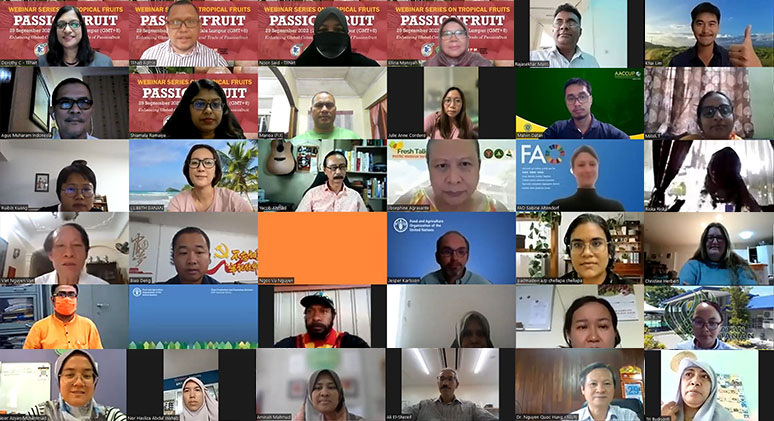The international webinar on ‘Enhancing global consumption and trade of passionfruit’ was held on 29 September 2022 and organized by the International Tropical Fruits Network (TFNet) with Guangxi Academy of Agricultural Sciences (GAAS), China, Universiti Putra Malaysia (UPM) Bintulu, Malaysia and Fruit Tree Research Institute, Guangdong Academy of Agricultural Sciences (GDAAS), China.
This is the second of a series of webinars on minor tropical fruits to be organized as part of TFNet’s efforts to share knowledge and increase the visibility of lesser-known minor fruits globally.
One hundred and sixty five participants comprised of researchers, extension and development officers, technical officers, growers, association members and other stakeholders from 20 countries including Bangladesh, China, India, Indonesia, Malaysia, New Zealand, Philippines, and Vietnam attended the webinar.
The five presentations delivered were:
- Development status of the passionfruit industry in Guangxi province and progress in the breeding of new varieties
Dr. Deng Biao
Horticulture Research Institute, Guangxi Academy of Agricultural Sciences Nanning, China - Current status and initiatives to develop passionfruit as a potential fruit crop in Malaysia
Dr. Shiamala Devi
Universiti Putra Malaysia, Bintulu Campus, Sarawak, Malaysia - Status of production, consumption and market of passionfruit in Indonesia
Dr. Ellina Mansyah
Research Center for Horticulture and Estate Crops, National Research and Innovation Agency, Republic of Indonesia - Current trends and challenges in passion fruit research and development in China
Dr. Ruibin Kuang
Fruit Tree Research Institute, Guangdong Academy of Agricultural Sciences, Guangzhou, PR China - Passionfruit development for the fresh and processing industry in Vietnam
Dr. Nguyen Van Viet
NaFoods Research and Development Institute for Agriculture, Hanoi, Vietnam
A panel discussion was moderated by TFNet advisor Yacob Ahmad after the presentations. The presenters addressed the questions from participants and discussed the future of the passionfruit industry.

Passionfruit (Passiflora edulis) is among other species under the Passiflora genus that grows as a vine and commercially produced mostly in Brazil, Ecuador, Columbia, China, Australia and Vietnam, and smaller amounts in other tropical and subtropical countries. Rich in vitamins, minerals, fiber and other bioactive compounds, passionfruit is usually eaten fresh or processed into juice. According to FAO, Brazil is the biggest producer with about 60 % of total production, while Ecuador, Australia and New Zealand are the main exporters. Currently amounts exported are low, as most of the fruit produced are domestically consumed. Cultivars of this fruit include purple passionfruit or gulupa (P. edulis Sims), granadilla (Passiflora ligularis), Giant passionfruit (Passiflora quadrangularis) and Land yellow passionfruit (P. edulis var. flavicarpa Degenerer).
Passionfruit is appealing because of its health benefits, unique exotic and intense taste, and relatively easy to produce. However, the global market is limited due to its niche nature, limited production, and lack of market promotion. Even though passionfruit is dwarfed by other more popular minor fruits, considering the growing global market demand for diverse, healthy and less popular minor fruits, there is big potential for it to be developed and expanded further. Mostly produced by smallholders and medium size growers, it makes a perfect fruit to grow in a mixed cropping system. There have been considerable research and development and other efforts to improve yields, quality, shelf life and market appeal by the main producing countries.
The webinar has indicated that generally, there is relatively good demand for passionfruit both for fresh consumption and processed products, however production has reportedly been inconsistent. While demand has been consistent for the main producing countries, the industry is also faced with production challenges especially regarding the control of pests and diseases (example – collar rot), selection of suitable cultivars and food safety and quality issues. The webinar also illustrated the different stages of development of the passionfruit industry in producing countries, for example China and Vietnam are at the forefront due to the high market and export demand, while others such as Malaysia and Indonesia are beginning efforts to enhance current production and demand.
Overall the webinar successfully reviewed some important R&D and trade achievements, and highlighted the significant development potential of the passionfruit as a popular minor fruit.
Report
You can also download the report here.

